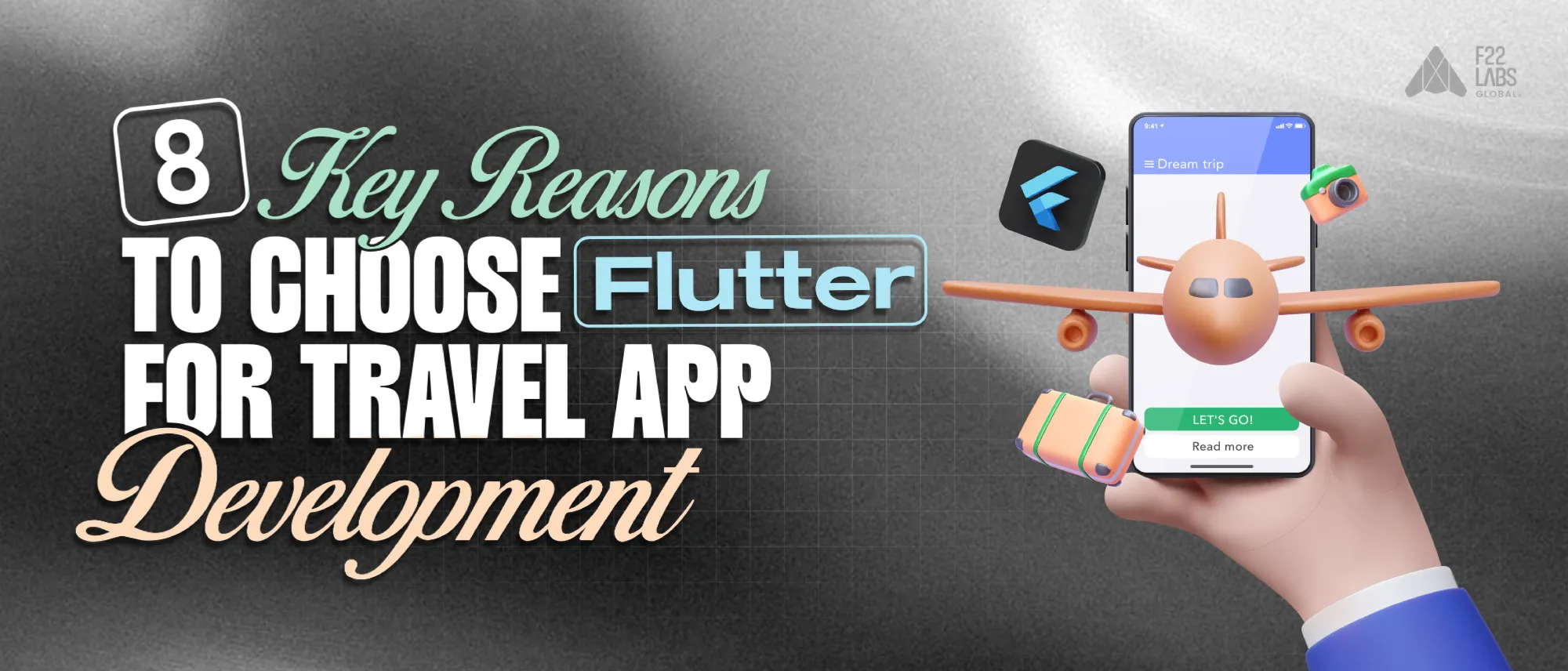8 Key Reasons to Choose Flutter for Travel App Development

Why are the latest mobile travel apps faster, smoother, and more user-friendly than ever before? The technology behind many of them is Flutter, Google’s open-source framework for building cross-platform apps. Instead of building separate iOS and Android apps, Flutter lets businesses use a single codebase, cutting time and cost while ensuring consistency. It has quickly become one of the fastest-growing mobile frameworks, now powering thousands of apps used worldwide.
Here, we’ll explore the top reasons to choose Flutter for travel app development. You’ll learn how it saves time, cuts costs, delivers smooth experiences, and scales with business growth. By the end, you’ll know exactly why leading travel brands are turning to Flutter.
What Is Flutter and Why Is It a Choice for Travel App Development?
Flutter is an open-source framework created by Google in 2017. Built with the Dart programming language, it uses a single codebase to deliver apps across iOS, Android, web, and desktop. This unified approach shows how Flutter works and makes it a strong choice for travel app development. Developers don’t need to write separate code for each platform, saving both time and cost.
Flutter has grown at lightning speed since its launch. By 2023, more than 400,000 apps had already been built using Flutter, including well-known apps like Google Ads, BMW, and Alibaba. According to Google, Flutter is now one of the top three most popular mobile frameworks worldwide, with millions of developers in its community.
Another reason Flutter is popular is its flexibility and performance. Unlike older frameworks that rely on “bridges” or web views, Flutter renders its UI directly using the Skia graphics engine, giving apps near-native speed and smooth animations. That’s why scrolling through hotel galleries, searching flights, or exploring maps in a Flutter app feels just as seamless as a native app.
Flutter also has strong backing from Google and its global developer community, which means constant updates, new features, and long-term support. For businesses, this ensures that an investment in Flutter will remain reliable for years to come.
Top 8 Reasons to Choose Flutter for Travel App Development
Travel apps need to run across devices, look attractive, and manage complex features like bookings, maps, payments, and multilingual content. Flutter matches these needs perfectly. Here are 8 reasons to use Flutter for travel app development.
1. Flutter for Travel App Development Save Time & Cost
Travel applications need to be iOS and Android-ready. Building two native apps from scratch double the work and cost. Flutter prevents this by providing a single codebase that works well for both platforms. Flutter projects often cost 30–40% less than separate native apps, which is a big advantage for travel businesses with tight budgets. Effective planning and smart development practices can further cut Flutter app costs, freeing up budget for marketing or new features.
For start-ups as well as established travel companies, this means faster launches and reduced mobile app development cost considerations. When it comes to updates, maintenance, and feature enhancements, a single engineering team can handle all.
For example, a travel booking business can build once on Flutter and publish anywhere. Instead of duplicating resources between iOS and Android teams, work focuses on one codebase. That's one strong reason companies use Flutter for building travel apps.
2. Hot Reload Speeds Up Travel App Updates
Travel apps are constantly changing. It’s either promotions, sales during seasons, or updates to booking policy, and this must be published in a hurry. Hot Reload by Flutter is what causes it to happen.
Let’s Build Your Flutter App Together!
Work with our expert team to turn your app idea into a fast, stunning Flutter product.
This feature allows developers to see code changes immediately without having to restart the app. It speeds up testing out UI designs, adding new features, or debugging. Developers can experiment and receive immediate feedback.
For travel companies, this flexibility matters. Let’s say they want to refactor a holiday package screen or add a new payment option. With Flutter, such changes roll out in hours, not weeks. Faster tweaks keep travel apps up to date and functional.
3. Flutter Offers Travel Apps Native-Speed Performance
Performance is a priority in travel apps. Slow map draws or searches annoy users. Flutter solves using Dart's Ahead-of-Time (AOT) compilation and the Skia engine. They work together to provide native speed and smooth animation.
This is what makes scrolling between flight choices, pinching to zoom into maps, or browsing hotel galleries feel natural and smooth. Users won't even realize they're on a cross-platform app.
When a travel app loads quickly and runs smoothly, users trust it more. This means greater interaction, increased bookings, and stronger brand loyalty for companies.
4. Building Customized Travel Experiences with Widgets
Travel apps must be beautiful to look at but not difficult to use. Flutter excels here with its widget system, which is highly customizable. Everything about the app can be tailored to suit the aesthetic of a brand, and structuring these components within the Flutter widget tree keeps the code clean while enabling complex, interactive designs like custom itineraries or booking flows.
Want a custom itinerary design, interactive map filtering, or conversational booking workflows? Flutter makes it possible without sacrificing performance. Flutter doesn't use web views like previous frameworks. Instead, Flutter renders its UI directly, giving total control over design.
This gives travel brands the freedom to be unique. Instead of relying on generic app templates, they can create unique designs that express their personality while ensuring usability.
5. Flutter Keeps Travel Apps Future-Ready
The travel space keeps growing fast, and up to date apps must follow. Flutter is supported by Google, with thousands of developers improving it everyday. This provides them with constant enhancements, regular updates, and enduring support.
Travel companies want certainty that their investment in the app will be worth it in five years. Flutter provides them with that. It also supports not only mobile apps but web and desktop apps. That means that a travel company can expand to a web booking portal or desktop dashboard without starting all over again.
Through a single technology stack, brands can expand smoothly as their needs evolve. This future-proofing makes Flutter a safe bet for long-term travel app development.
6. Augmented Reality (AR) and Virtual Reality (VR) in Travel Apps
Travellers want more than looking at static photos when planning holidays. AR and VR give them real previews. A customer can point their phone at a location with AR and get directions or find nearby places instantly. VR lets them get a tour of hotel rooms or a museum before booking tickets.
Flutter allows adding AR and VR easily with plugins and third-party tools. Developers can simply add these without framework changes. For travel businesses, this means more interactive apps that create stronger user engagement. A traveler who can "experience" their journey before purchasing is likely to make a purchase.
7. AI Integration for Smarter Travel Apps
Artificial Intelligence (AI) is changing the way travel app users interact with applications. Instead of a user searching endlessly, AI can predict what a traveler needs. For example, the app can recommend flights based on past bookings, suggest hotels near favored locations, or adjust search results based on budget needs.
Flutter makes it easy to incorporate AI services like machine learning APIs and chatbots. Travel agencies are able to use AI to answer customer questions in real-time, predict delays, or even generate personalized travel guides. These smart features save the user time and make the app more useful. For businesses, it means happy customers who keep coming back.
Let’s Build Your Flutter App Together!
Work with our expert team to turn your app idea into a fast, stunning Flutter product.
8. Blockchain and Secure Transactions
At the center of travel apps is trust and payment. A customer should feel secure when they input card numbers or their personal info. Blockchain technology helps by making records open and unalterable. Tickets, hotel coupons, and rewards may be stored securely to prevent fraud from occurring.
Flutter supports blockchain-based APIs and services. This allows developers to build things like secure ticket verification, trusted reviews, and safer peer-to-peer payments. It means worry-free travel for travelers. It strengthens a company’s image by showing it is safe for travel bookings. A number of the world's leading companies are using Flutter to power high-performance and interactive apps across platforms. Google trusts Flutter for both Google Ads and internal apps, a clear sign of its ability to perform at scale.
With more than 150,000 stars on GitHub and a global developer community, Flutter continues to improve and stay future-ready.
For travel businesses, choosing Flutter is not just about existing needs, it's about making an investment in a framework that's relied upon by one of the world's biggest tech brands.
Key Features of Flutter That Makes Travel Apps Easy
Travel apps are based on key features, and Flutter makes them easy to use via plugins and packages.
- Maps: With Flutter, you can add Google Maps or OpenStreetMap. This enables personalized travel itineraries, navigation, and local guides.
- Offline Availability: With caching support, travelers can download tickets or itineraries and access them offline. This is something needed for travelers overseas.
- Safe Payments: Flutter supports gateways like Stripe, PayPal, and Razorpay. Payment and bookings are secure and smooth.
- Multilingual Support: Travel applications must function across languages. Flutter's localisation features support English, Spanish, Chinese, or any other language a brand needs. This opens up the app globally.
- Voice Search and Commands: Travelers can search flights or bookings by speaking. Voice commands also make navigating the app faster and simpler.
- Push Notifications: Apps can send instant alerts for discounts, offers, or updates. This keeps users engaged and encourages quicker bookings.
- Flight and Hotel Bookings: Flutter allows integration with the APIs of airlines' and hotels'. The customers are able to search, filter, and book directly within the app.
These capabilities enable the developers to focus on value-addition instead of replicating what already exists. For travel businesses, it means quick releases and feature-rich apps.
Conclusion
Choosing Flutter for travel app development has a lot of advantages. It reduces expenses, helps faster deployment, gives native-quality experience, and offers unlimited customization. It also gives the prospect of future enhancement.
For travel companies, it means offering apps that travelers enjoy using. This refers to apps that are fast to launch, offline-ready, and make booking easier.
If you’re planning to build or upgrade a travel app, working with a Flutter app development company gives you the right mix of speed, quality, and long-term value. By adopting Flutter now, you can give your users better travel experiences now and in the future.



